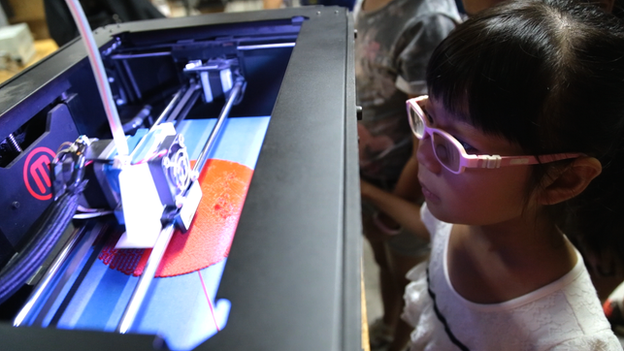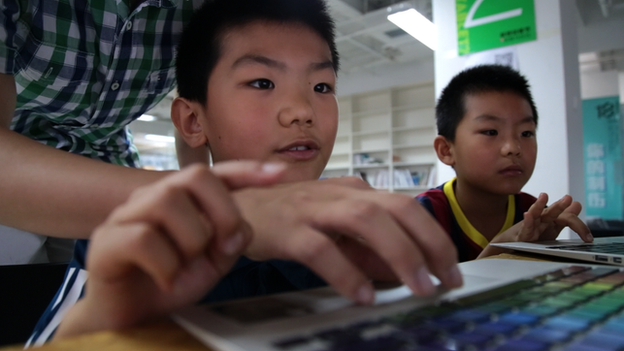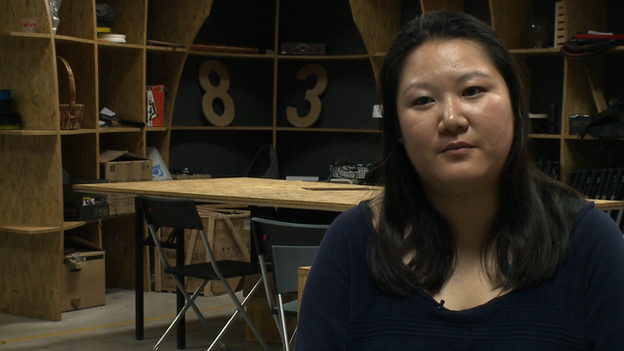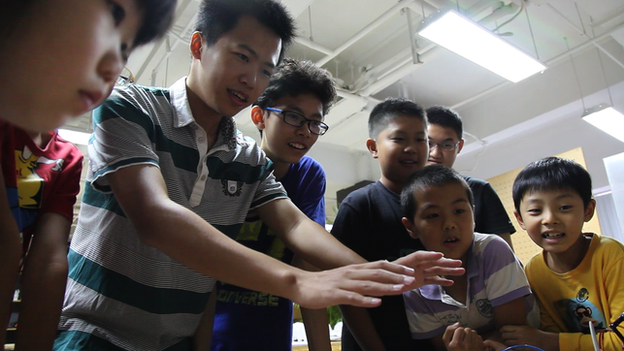Hi-tech classes for Chinese children
- Published
Creatica aims to teach Chinese children a new way of thinking
"Innovative" is not a word people usually use to describe China, but entrepreneur Joanna Wei is trying to do her part to change the perception of a country filled with cheap knock-offs and back-breaking sweatshops.
Ms Wei co-founded the Beijing-based Creatica, an educational company with a different approach to teaching young people in China. It aims to revolutionise education by providing immersive hands-on creative workshops for young children.
The company started last year in Beijing Makerspace, a large office space where innovators can turn their ideas into businesses.
"What we are doing is rethinking education," Ms Wei explains. "We are a platform that provides access to cutting-edge technologies, and we promote a new way of thinking."
Broadening the mind

3D printing is just one workshop at Creatica breaking the education mould
One of Creatica's most popular classes is called Brushbot. It teaches students to make robots out of toothbrushes by wiring them to vibrating motors.
Another class, Talking Buddies, teaches students to design a character, make a cardboard cut-out and make it talk by connecting it to a small recording device.
When the maker movement - a technology-based do-it-yourself culture - started taking off in China in 2011, Ms Wei didn't think it would become so big.
"I thought makers were a group of do-it-yourself people of scanty means," she jokes. "But the first ever event we whipped together was phenomenal. Hundreds of thousands of people turned up. It was so much fun."
Creatica was a product of the maker movement. Ms Wei noticed that there was nothing geared for tech-savvy kids.
She realised that it was too late to plant the idea of innovation in the minds of 20-year-olds, and she needed to start with children. The idea of doing it through education came naturally.
"I'm not a geek," she says. "But I knew that to really spread the influence of innovation from a niche community to the masses, education is the key."
Rethinking education

Robotics is child's play at Creatica
Unlike many start-ups, Creatica quickly became profitable. It now serves hundreds of families, mostly wealthy ones in big Chinese cities.
"Education is an almost zero-cost business," Ms Wei says. "We spent some money renting a place, and simply used the other innovators who work in Beijing Makerspace as mentors.
"They have the tech knowledge and we connected them with young people who want to learn."
Classes are held more regularly now than when they first started - either every week or every other week. They also have summer and winter camps with a bigger capacity for students.
Their class prices are set. A half-day class costs 550 yuan (£55; $90), and for a full-day one it is 1,100 yuan. Sometimes they hold family days, where parents are invited to learn with their children, but there are no additional charges.
However, in China's lucrative education market, Creatica is competing with a plethora of other classes - piano, violin and college admission tutorials like SAT or TOEFL.

Joanna Wei says Creatica depends on parents telling other parents about the workshop
"I wasn't very confident in the beginning," Ms Wei says. "It was a big challenge. Although tech education is quite integrated in schools in the West, not many Chinese parents know what it is.
"We don't have a budget for commercial advertising, so we mainly depend on word of mouth. Many parents who sent their children here are employees from top tech companies, and they also help promote us in their own circles."
It didn't take long for Ms Wei's idea to take off. Some parents would even fly to Beijing with their children just to make Creatica's classes.
One parent from Dalian in northern China told Ms Wei that the most creative thing they had in their city was Lego, and that just wasn't enough.
The mentors

The Brushbot class teaches students to make robots out of toothbrushes by wiring them to vibrating motors
Creatica's success also reflects a need for change in what some call China's "stuff-the-duck" education system, which forces students to study mainly for standardised tests.
Creatica's youngest mentor, 15-year-old Wang Yixiao, came from this system. Growing up, he had a talent for making things out of digital scraps but had to teach himself until he found Creatica.
"Creatica filled a void," he says. "I learned everything from the internet, but when I had any questions, I had no-one to turn to."
In the future, Ms Wei wants to bring Creatica to the wider community, not just the children of the Chinese elite. She hopes to have more government and corporate support, and for Creatica to be integrated into the everyday education of Chinese children.
"Made in China" is fading out, and now with innovative thinkers like Creatica's kids, Ms Wei and her colleagues want to see things created - and not just made - in China.
"People think we can't have a Chinese Steve Jobs, but I don't believe that," Ms Wei says with confidence. "I believe if these kids can keep thinking and making things, they can create something like Apple in China."